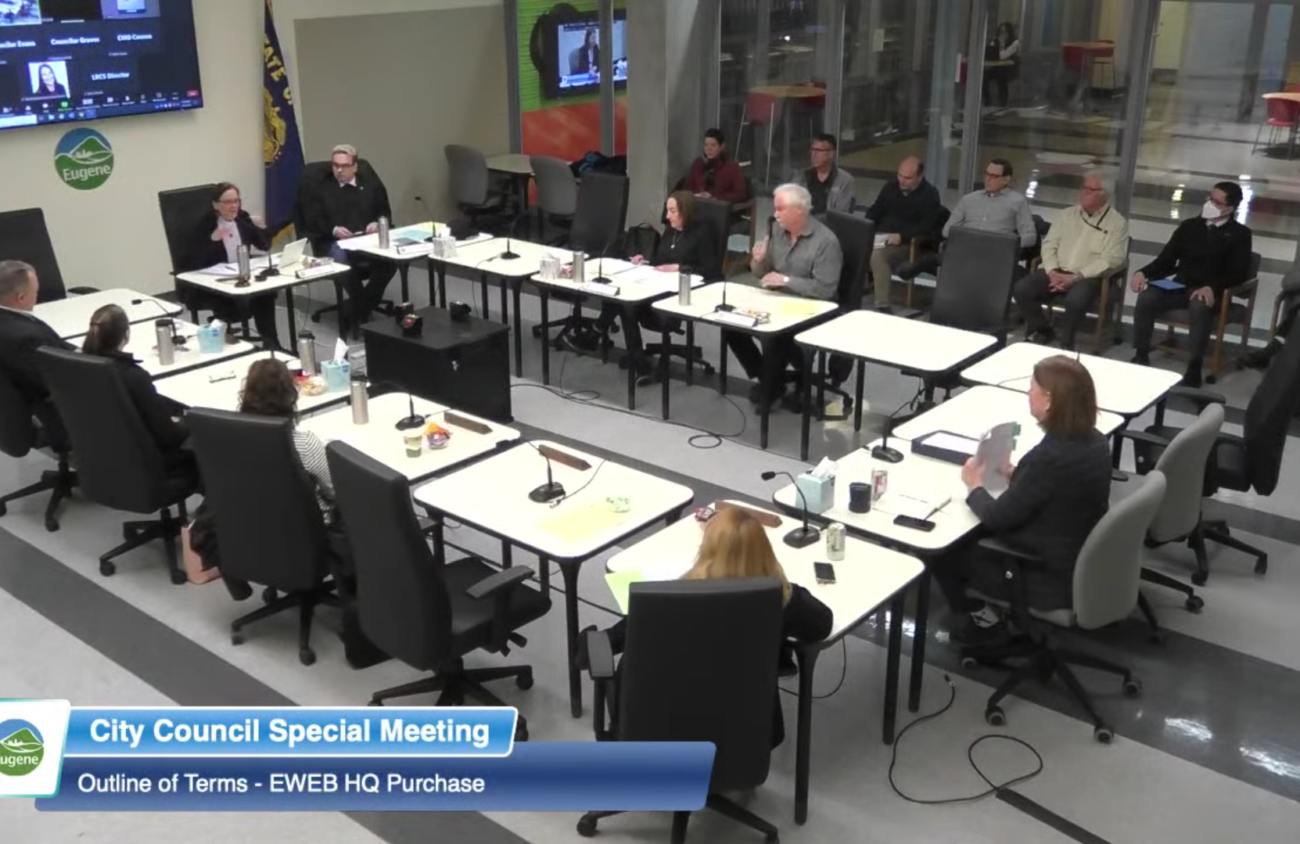Eugene is buying a riverfront home.
At a Jan. 30 special meeting, the Eugene City Council voted 7-1, with Councilor Emily Semple dissenting, to purchase Eugene and Water Electric Board’s former headquarters for $12 million. The 4.4 acre property is planned to house City Hall and city operations. City Manager Sarah Medary said at the meeting that the city’s change of heart in the space is due to the price being lower than new construction.
The purchase of the EWEB building near the Willamette River is a new chapter in a long story of Eugene’s pathway to establishing a new City Hall. “Discussions of City Hall and what the community thought date back to 1909, so it’s a pretty rich history,” Medary said.
The more recent City Hall history starts in 2014, when the city vacated — and tore down — 777 Pearl Street. In 2016 when the city went out to bid for its new City Hall, Medary said, “Council made a decision to wait a couple of days until after a conversation with the county, who had an idea for a potential different use of the land,” so the two governments swapped the land.
The county wanted to build a new courthouse on the former City Hall property, a project whose funding was not approved by voters, and is currently used as a parking lot. Meanwhile, the city of Eugene kept looking for a new solution for City Hall. According to previous reporting by Eugene Weekly, in 2015, the city learned that building a new City Hall would cost about $25 million. In January 2021, the city announced that it would move into Lane Community College’s downtown campus on a three year lease. The city paid about $14,500 a month in the first year of the lease and about $16,000 a month in the second year of the lease. Beginning Dec. 1, the amount increased 3 percent per year. The lease ends November 2023.
The plans for the Farmer’s Market Pavilion, Park Block and City Hall were meant to be near each other, Medary said at the Jan. 30 meeting. As late as early 2020, Medary said the city was about to undergo another round of City Hall planning. Then the pandemic hit, and Medary said she was new to the job and the city decided to pause on City Hall and focus on community response. “Not be out there to generate revenue for a City Hall we didn’t have during a time when businesses were closing down and people were asking for support,” she added.
In late 2022, when the EWEB Board of Directors gave General Manager Frank Lawson the authority to sell the former headquarters, Medary said she called him to ask if the property was still available. “It makes a whole lot of sense for a future City Hall,” she said.
According to Jan. 30 meeting materials, purchasing the former EWEB building allows the city to locate more of its operations into one building. That means vacating the fourth floor of the Eugene Public Library so it can expand. And the EWEB building has more space for public meetings compared to its current meeting space at LCC’s downtown campus, as well as increased parking spots.
Medary said when the council first discussed the potential of purchasing EWEB’s riverfront building in 2016, the cost of the purchase and the renovations was more of an issue then than it is today. She said the acreage of the property also opens the door for building a fire station nearby, housing and parking for the Riverfront Park.
The city has spent $50 million in connecting downtown to the river, Medary said, and having City Hall in the former EWEB building caps that plan.
According to Jan. 30 meeting materials, the cost of the building is $12 million, $8 million of which is due by closing. The remaining balance is to be paid within five years of the closing date with a 4 percent annual interest rate.
“That allows us the flexibility to purchase the building and actually make the first round of investments that we need to happen to create the council chambers, do some basic things to do a first phase move in,” Medary said, adding that city staff estimates puts the renovations in the $4 million to $5 million range. “This gives us flexibility without dipping into reserves.”
The city is paying for this from an account that it has saved for City Hall for several years, which Medary said has dwindled over time.
Medary said the city is now in a due diligence period, during which it’ll examine the property and plan its move-in. The city’s closing date for the property is July 1.
Although the majority of council gushed at the development opportunities possible with the purchase of EWEB’s former headquarters, Semple was disappointed in moving forward with the sale while a committee has been exploring ways to “save downtown” and reiterated that the city shouldn’t have torn down its historic mid-century City Hall in 2014.
“It’s a beautiful building, but it wouldn’t be my first choice,” Semple said about the EWEB property. “The loss of employees downtown will impact businesses, daytime safety and activity.”
